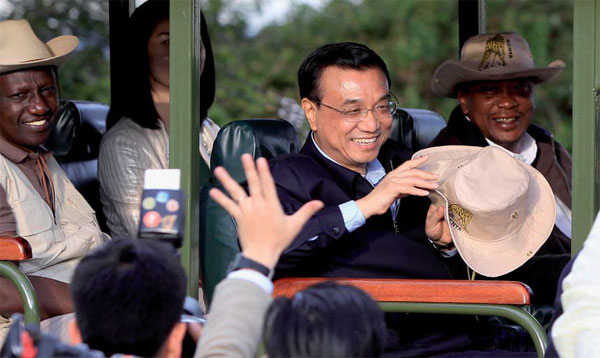Leaders hail China-Kenya friendship
|
Premier Li Keqiang, accompanied by Kenyan President Uhuru Kenyatta on his left, prepares to visit Nairobi National Park on May 10. Noor Khamis / Reuters |
Visit brings premier Li keqiang's four-nation, eight-day african trip to an end
Experts said Premier Li Keqiang's four-day visit to Africa consolidates growing and deepening relations with Africa.
He visited Ethiopia, Nigeria, Angola and Kenya from May 4 to 11, his first trip to Africa since taking office in 2013.
On May 11, China and Kenya pledged to boost their cooperative partnership. Li and Kenyan President Uhuru Kenyatta hailed the expanding trade, economic and development ties between the countries, and agreed to further strengthen cooperation in trade, investment, infrastructure development and other areas.
China will continue to provide support to Kenya, particularly in the implementation of major flagship projects under Kenya's Vision 2030 development blueprint as well as encourage Chinese financial institutions and enterprises to invest in Kenya and facilitate greater access for Kenyan products into the Chinese market, a joint statement said.
Alex Vines, the head of the Africa Program at Chatham House think tank in London, said the visit was significant because it emphasized the importance for Africa of Chinese investment.
"I think some of the pledges that have been made in some of the African countries - Ethiopia, Nigeria and Angola - have solidified the growing and deepening relationships that are already there and remind everybody that China is an important player in Africa today," said Vines.
"The real impact is that this visit to Africa by Premier Li emphasizes to the rest of the world that actually Africa is a continent of the future. There are opportunities for partnerships and for business."
For Andrew Brooks, a lecturer in development geography at King's College of the University of London, China's strengthening relations with Africa are just one element of a significant shift in the early half of the 21st century.
"We are seeing China rising as a global power, and the pivot of geopolitical influence moving from West to East," Brooks said. "So, China's increasing engagement with Africa is part of a broader set of patterns.
"What is more interesting is the diversity of Chinese business interests. So, a small independent shopkeeper operating in a market in Johannesburg is very different to the Chinese national oil companies which are engaging on the west coast of Africa."
In 2009, China overtook the United States as Africa's biggest trading partner, and some 2,500 Chinese firms are now operating on the continent. Bilateral trade between China and African countries reached $210 billion in 2013.
However, Africa accounts for just 5 percent of China's global trade, and 3 percent of foreign direct investment.
Other nations will see the China-Africa relationship as a reminder of what Africa has to offer.
Vines said: "Some of the South American countries, Brazil for example, all are deepening their relationships. Indeed there is a Turkey-Africa summit planned for November this year in Equatorial Guinea."
Vines said Li's visit was about consolidating the China-Africa relationship.
"We are in a multipolar world with many different relationships," he said.
"And African governments in particular can choose. So, for example, the trip of Premier Li to Angola shows just how important that relationship is, particularly for Angola but also for China."



















